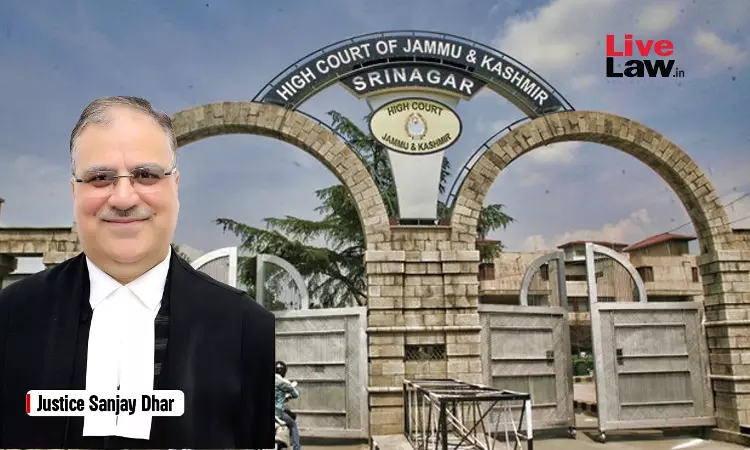- Home
- /
- High Courts
- /
- High Court of J & K and Ladakh
- /
- Family Pension Rules Must Be...
Family Pension Rules Must Be Interpreted Liberally For Disabled Dependents: J&K High Court
LIVELAW NEWS NETWORK
13 May 2025 11:10 AM IST
Underscoring the importance of social welfare and inclusive interpretation of pension rules, the Jammu and Kashmir and Ladakh High Court has ruled that provisions governing family pension for disabled persons must be interpreted liberally to ensure genuine claimants are not excluded.“The provisions governing the grant of family pension to a disabled person cannot be interpreted in a...
Underscoring the importance of social welfare and inclusive interpretation of pension rules, the Jammu and Kashmir and Ladakh High Court has ruled that provisions governing family pension for disabled persons must be interpreted liberally to ensure genuine claimants are not excluded.
“The provisions governing the grant of family pension to a disabled person cannot be interpreted in a narrow sense, so as to exclude genuine claims. Such provisions have to be interpreted liberally so that the benefit of this essential security measure is extended to all deserving and eligible persons,” observed Justice Sanjay Dhar while directing State Bank of India (SBI) to release family pension to a severely disabled woman whose father had served the bank as a security guard.
The petitioner, Smt. Balbir Kour, a resident of Budgam, Kashmir had approached the High Court challenging a communication by which SBI had rejected her request for family pension. Her father, Shri Joginder Singh, a retired Army personnel, had later served as a guard in SBI from 1971 until his superannuation in 1994. Following his death in June 2010, the petitioner, who is 100% disabled and suffers from a congenital disease that led to the amputation of both hands and later a below-knee surgery, applied for family pension as a dependent.
Her mother, who would have been the first eligible recipient, had predeceased her father. The Army authorities had already recognized her disability and sanctioned family pension in her favour, recommending the same to SBI. Despite this, SBI rejected her claim on technical grounds, prompting her to move the court.
Court Observations:
Justice Dhar, conducted a detailed examination of the pension eligibility instructions issued by the bank and noted that a son or daughter who is physically crippled or disabled and unable to earn a living may be granted family pension for life, provided the disability manifests before the retirement or death of the employee while in service.
The Bank argued that since the petitioner underwent a below-knee amputation in 2009, her disability could not be considered to have manifested prior to her father's retirement in 1994. Furthermore, she was over 25 years of age, not named as a beneficiary in the bank records, and her claim was delayed by eight years.
The Court, however, firmly rejected this narrow construction. Noting that the petitioner's disability was due to a congenital incurable disease present from birth (1966), and that her auto-amputation of hands had already occurred before the 2009 surgery, the Court held,
“The fact that the petitioner was suffering from incurable congenital disease which led to her disability clearly goes on to show that the disability had manifested itself in the petitioner right from the day of her birth. Thus she had incurred disability even when her father was very much in service.”
Interpreting the expression “manifests” under the pension rules in a liberal light, the Court emphasized that it should cover even those whose congenital conditions progressively worsen. A strict temporal reading, the Court held, would defeat the purpose of the pension scheme,
“The objective of granting pension to a disabled person is to ensure social security and financial assistance to those who are unable to sustain themselves. … Merely because the effects of the congenital disease were less pronounced during the initial years of a disabled person, would not disentitle such person to get the family pension.”, the court reasoned.
Accordingly, the Court found that the respondent bank's rejection had been based on an unduly narrow and unjust reading of its own rules, and that this amounted to a miscarriage of justice.
Rejecting the Bank's other contention that the petition was delayed, the Court noted that Balbir Kour had initially approached the High Court in 2011, after which SBI was directed to take a decision. The final rejection came only in 2020, and the present petition was filed in 2023. Taking into account the petitioner's physical condition and complete dependence on others, the Court said it was not feasible to expect prompt legal action from her and found no undue delay.
“While considering the justification for delay in filing the writ petition, we have to take into account the fact that the petitioner is a crippled person who depends completely upon others. In such circumstances it would not have been possible for the petitioner to consult the lawyer to file writ petition immediately after issuance of impugned communication dated 23.04.2020”,the court remarked.
Quashing the impugned rejection letter, the Court directed the SBI to process and sanction the petitioner's family pension claim in accordance with the rules within two months.
“The impugned communication dated 23.04.2020 is quashed. The respondents are directed to process the Family Pension case of the petitioner and sanction the same in her favour as admissible under the rules within a period of two months.”, the court concluded.
Case Title: Smt Balbir Kour Vs State Bank Of India
Citation: 2025 LiveLaw (JKL) 183



